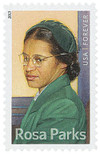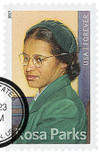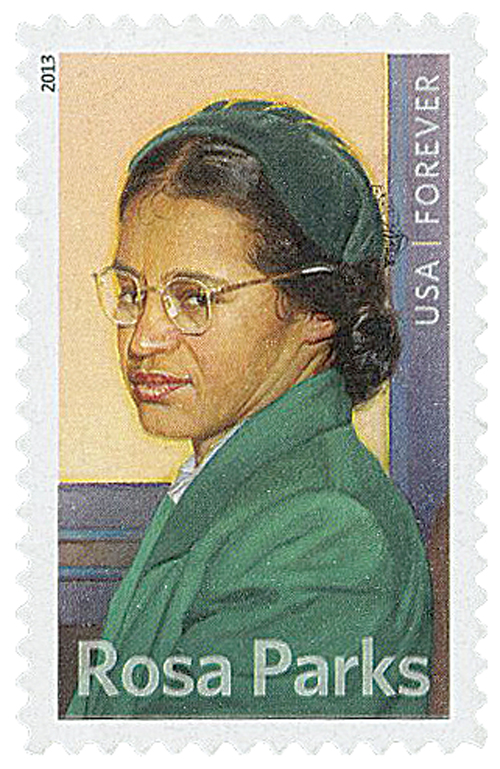
# 4742 - 2013 First-Class Forever Stamp - Rosa Parks
U.S. # 4742
2013 46¢ Rosa Parks
Civil Rights Set
Value: 46¢ First-Class letter rate
Issued: February 4, 2013 – Parks’ 100th birthday and the National Day of Courage
First Day City: Dearborn and Detroit, MI
Type of Stamp: Commemorative
Printed by: Avery Dennison
Method: Photogravure printing in sheets of 200, with 10 panes of 20
Perforation: Serpentine Die Cut ¾
Self-Adhesive
Quantity Printed: 63,000,000 stampsa
Birth of Rosa Parks
Rosa Parks grew up in Alabama at a time when segregation was a way of life. She attended poorly funded schools for black children, while the white students went to newer schools. She dropped out of high school to care for her mother and grandmother who were ill. Later, she earned a high school diploma, something only seven percent of African Americans were able to do at the time.
In 1943, Parks and her husband joined the Montgomery chapter of the NAACP (National Association for the Advancement of Colored People), and she was elected secretary. During the summer of 1955, Parks attended the Highlander Folk School, which trained activists working for racial equality.
On December 1 of that year, Parks put her training into practice. After finishing her shift as a seamstress in a local department store, she boarded a city bus and sat in the “colored” section near the middle of the bus. When the white-only seats were filled, the driver told the passengers in Parks’ row to give up their seats. She refused to move and was arrested.
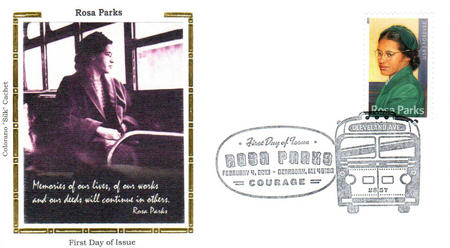
That Sunday, the black churches in the area announced a boycott of the public buses the next day in support of Parks. It rained on Monday, but African Americans held to their commitment and walked or carpooled to work and school.

Parks was convicted of disorderly conduct and violating a local ordinance, even though the law at the time said no passenger was required to give up their seat if the bus was crowded. She decided to appeal the ruling. Parks later said, “There was an opportunity for me to take a stand to express the way I felt about being treated in that manner.”
The appeal process progressed slowly through the Alabama courts. The bus boycott continued for over a year, severely damaging the finances of the bus company. The city later repealed the law that permitted segregation on buses.
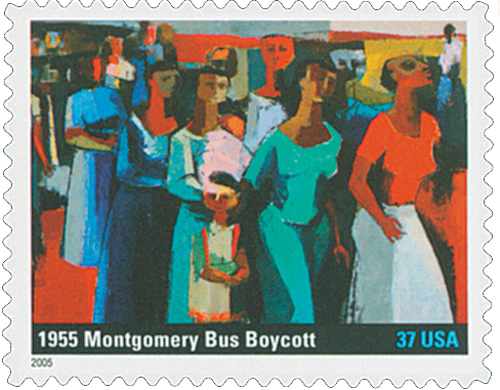
Shortly after her arrest, Parks and her husband both lost their jobs due to the case. With both unable to find work, they decided to move to Detroit. There, Parks worked as secretary and receptionist for US Representative John Conyers and on the board of the Planned Parenthood Federation of America. In the 1980s, Parks established the Rosa and Raymond Parks Institute for Self-Development, which runs Pathways to Freedom bus tours to educate young people on the Underground Railroad and Civil Rights movement.

Parks received a number of honors during her lifetime, including the NAACP Spingarn Medal, the Presidential Medal of Freedom, and the Congressional Gold Medal. In 1999, Time magazine named Rosa Parks one of the 20 most influential and iconic figures of the 20th century.
Parks suffered from dementia in her later years and died in Detroit on October 24, 2005. She was the first woman and second African American to lie in honor at the US Capitol after her death.
U.S. # 4742
2013 46¢ Rosa Parks
Civil Rights Set
Value: 46¢ First-Class letter rate
Issued: February 4, 2013 – Parks’ 100th birthday and the National Day of Courage
First Day City: Dearborn and Detroit, MI
Type of Stamp: Commemorative
Printed by: Avery Dennison
Method: Photogravure printing in sheets of 200, with 10 panes of 20
Perforation: Serpentine Die Cut ¾
Self-Adhesive
Quantity Printed: 63,000,000 stampsa
Birth of Rosa Parks
Rosa Parks grew up in Alabama at a time when segregation was a way of life. She attended poorly funded schools for black children, while the white students went to newer schools. She dropped out of high school to care for her mother and grandmother who were ill. Later, she earned a high school diploma, something only seven percent of African Americans were able to do at the time.
In 1943, Parks and her husband joined the Montgomery chapter of the NAACP (National Association for the Advancement of Colored People), and she was elected secretary. During the summer of 1955, Parks attended the Highlander Folk School, which trained activists working for racial equality.
On December 1 of that year, Parks put her training into practice. After finishing her shift as a seamstress in a local department store, she boarded a city bus and sat in the “colored” section near the middle of the bus. When the white-only seats were filled, the driver told the passengers in Parks’ row to give up their seats. She refused to move and was arrested.

That Sunday, the black churches in the area announced a boycott of the public buses the next day in support of Parks. It rained on Monday, but African Americans held to their commitment and walked or carpooled to work and school.

Parks was convicted of disorderly conduct and violating a local ordinance, even though the law at the time said no passenger was required to give up their seat if the bus was crowded. She decided to appeal the ruling. Parks later said, “There was an opportunity for me to take a stand to express the way I felt about being treated in that manner.”
The appeal process progressed slowly through the Alabama courts. The bus boycott continued for over a year, severely damaging the finances of the bus company. The city later repealed the law that permitted segregation on buses.

Shortly after her arrest, Parks and her husband both lost their jobs due to the case. With both unable to find work, they decided to move to Detroit. There, Parks worked as secretary and receptionist for US Representative John Conyers and on the board of the Planned Parenthood Federation of America. In the 1980s, Parks established the Rosa and Raymond Parks Institute for Self-Development, which runs Pathways to Freedom bus tours to educate young people on the Underground Railroad and Civil Rights movement.

Parks received a number of honors during her lifetime, including the NAACP Spingarn Medal, the Presidential Medal of Freedom, and the Congressional Gold Medal. In 1999, Time magazine named Rosa Parks one of the 20 most influential and iconic figures of the 20th century.
Parks suffered from dementia in her later years and died in Detroit on October 24, 2005. She was the first woman and second African American to lie in honor at the US Capitol after her death.








